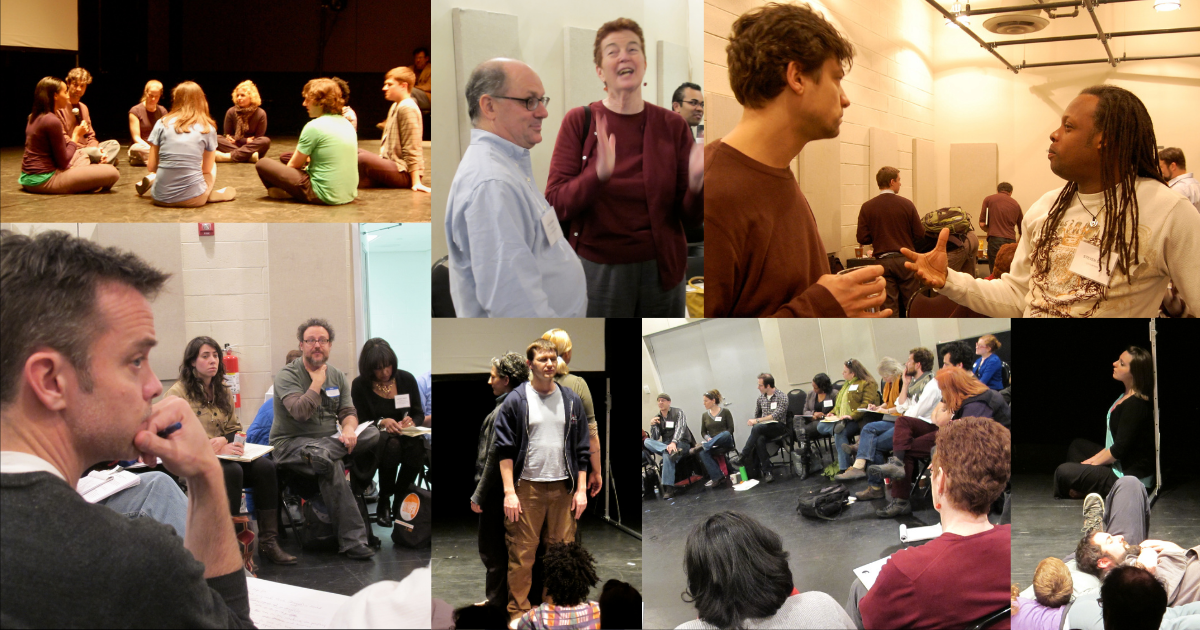Theatre Outside the Box: Devised Work
Washington, DC, 19-20 February 2010
The convening Theatre Outside the Box: Devised Work brought approximately fifty theatremakers to Washington, DC to discuss the state of devised work. The convening was lead produced by Ronee Penoi, then part of the inaugural class of New Play Producing Fellows at the American Voices New Play Institute (the precursor to HowlRound) and hosted at and in collaboration with the Davis Performing Arts Center at Georgetown University. Theatre Outside the Box: Devised Work brought together companies, ensembles, and individual artists who were working in methods different from the new play development process that centered on a single playwright. In addition, this convening invited funders into the conversation to help formulate questions around how to best support this type of innovative work. Read pre-convening notes from David Dower here.
“The fundamental gap is that by the time we are ready to talk about the work coherently we have needed [support] for two years. And for us that’s the major gap: that [support] comes at the end of the process.” — Rachel Chavkin
The convening focused on facilitated conversations featuring “the generative artists,” or those creating devised work, and the producers/presenters/funders who were interested in developing and supporting these artists. (See the full list of attendees.) Many of the artists pointed to the same types of issues: it’s difficult to get funding for a “hunch” (as Kirk Lynn from the Rude Mechs called it) but defining a project early can hinder the collaborative nature of the devising process. Highlights of the conversations included discussions around the following questions:
- What gaps in the infrastructure are generative artists—those who work outside the model of an organization structured around the needs of individual playwrights—experiencing in the development path of their work?
- What challenges are funders, presenters, or producers working to advance devised work encountering in supporting it?
- What is the role of, and need for, dramaturgy in this sector?
- How, when, and why does the audience get involved in the artist’s process, and what sort of influence does the potential audience have on what they make?
“How presenters might engage in this process is something to think about not in terms of fixing, but asking in the process of making, which translates to their capacity to invite people.” — Melanie Joseph
Those on the more presenting and funding side of the table understood the need for more funded development time, and the entire group discussed the roles of both dramaturgs and audience members in the work of devising. Conversation swirled around audience development and how community engagement, audience development, and participatory theatre processes could best function symbiotically.
Read the convening report by Janine Sobeck

“Audiences want to be a part of the process. They’re not the old audience that’s just going to buy a ticket and show up and say, ‘Wow me.’” Leatrice Ellzy
Theatre Outside the Box: Devised Work outlined many of the challenges and opportunities around creating and producing devised and ensemble work, and laying a foundation for new pathways to support its creation. The two-day convening also featured a public-facing event called “How the Devising’s Done: Theatre Mavericks Talk Process,” a discussion of devising process and process sharing from Lynn, Barney O'Hanlon of SITI Company, Andy Paris of Tectonic Theater Project, and Geoff Sobelle of Rainpan 43. This event was livestreamed and engaged Georgetown students and the DC theatremaking community. Watch the event on YouTube here.
Read related HowlRound content
